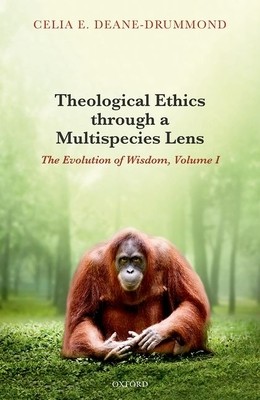
- We will send in 10–14 business days.
- Author: Celia E Deane-Drummond
- Publisher: Oxford University Press, USA
- ISBN-10: 0198843348
- ISBN-13: 9780198843344
- Format: 15.5 x 23.9 x 2.3 cm, hardcover
- Language: English
- SAVE -10% with code: EXTRA
Theological Ethics Through a Multispecies Lens (e-book) (used book) | bookbook.eu
Reviews
Description
There are two driving questions informing this book. The first is where does our moral life come from? It presupposes that considering morality broadly is inadequate. Instead, different aspects need to be teased apart. It is not sufficient to assume that different virtues are bolted onto a vicious animality, red in tooth and claw. Nature and culture have interlaced histories. By weaving in evolutionary theories and debates on the evolution of compassion, justice and wisdom, it showa a richer account of who we are as moral agents. The second driving question concerns our relationships with animals. Deane-Drummond argues for a complex community-based multispecies approach. Hence, rather than extending rights, a more radical approach is a holistic multispecies framework for moral action. This need not weaken individual responsibility. She intends not to develop a manual of practice, but rather to build towards an alternative philosophically informed approach to theological ethics,
including animal ethics. The theological thread weaving through this account is wisdom. Wisdom has many different levels, and in the broadest sense is connected with the flow of life understood in its interconnectedness and sociality. It is profoundly theological and practical. In naming the project the evolution of wisdom Deane-Drummond makes a statement about where wisdom may have come from and its future orientation. But justice, compassion and conscience are not far behind, especially in so far as they are relevant to both individual decision-making and institutions.
EXTRA 10 % discount with code: EXTRA
The promotion ends in 14d.17:49:42
The discount code is valid when purchasing from 10 €. Discounts do not stack.
- Author: Celia E Deane-Drummond
- Publisher: Oxford University Press, USA
- ISBN-10: 0198843348
- ISBN-13: 9780198843344
- Format: 15.5 x 23.9 x 2.3 cm, hardcover
- Language: English English
There are two driving questions informing this book. The first is where does our moral life come from? It presupposes that considering morality broadly is inadequate. Instead, different aspects need to be teased apart. It is not sufficient to assume that different virtues are bolted onto a vicious animality, red in tooth and claw. Nature and culture have interlaced histories. By weaving in evolutionary theories and debates on the evolution of compassion, justice and wisdom, it showa a richer account of who we are as moral agents. The second driving question concerns our relationships with animals. Deane-Drummond argues for a complex community-based multispecies approach. Hence, rather than extending rights, a more radical approach is a holistic multispecies framework for moral action. This need not weaken individual responsibility. She intends not to develop a manual of practice, but rather to build towards an alternative philosophically informed approach to theological ethics,
including animal ethics. The theological thread weaving through this account is wisdom. Wisdom has many different levels, and in the broadest sense is connected with the flow of life understood in its interconnectedness and sociality. It is profoundly theological and practical. In naming the project the evolution of wisdom Deane-Drummond makes a statement about where wisdom may have come from and its future orientation. But justice, compassion and conscience are not far behind, especially in so far as they are relevant to both individual decision-making and institutions.


Reviews